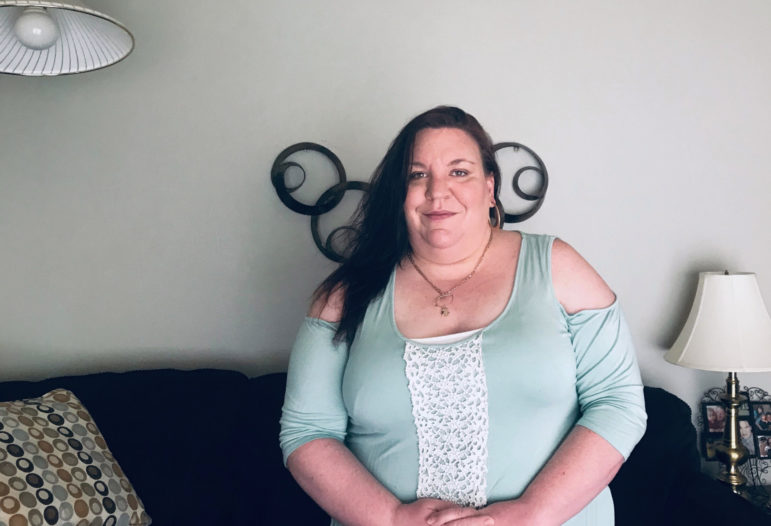Before the pandemic, Jessica Barrera worked part-time for an airport shuttle service in Eau Claire, serving local travelers en route to larger cities like Minneapolis. She cherished hearing stories about the far-off places people had visited.
“People tell me about their trips to Italy or Mexico or Iceland — or even just other states,” Barrera said, adding that her financial status would probably prevent her from ever visiting such places.
Minnesota and Illinois are about as far as she’s gone from home.
News with a little more humanity
WPR’s “Wisconsin Today” newsletter keeps you connected to the state you love without feeling overwhelmed. No paywall. No agenda. No corporate filter.
The 40-year-old single mother shares a $900 per-month apartment with her 10-year-old son Niko. Groome Transportation laid her off when the shuttle service shut down because the pandemic halted travel. The Wisconsin Department of Workforce Development denied her unemployment insurance claim because she receives federal disability benefits due to her rare blood disorder and a history of depression stemming from family tragedies. In 2013, Wisconsin banned laid-off recipients of federal disability benefits from also receiving unemployment benefits.
After three months without a working wage — and a credit score that plunged when she maxed out her credit card to keep her apartment — Barrera started a new job on June 6, working in marketing services at Menards on the weekends.
“Who would have ever thought going to work you have to wear a mask to get in?” Barrera reflected after her first weekend on the job. “When you come back from lunch, you have to get your temperature taken again.”
Menards requires her to wear a mask. In March, she bought thick, cloth masks that seemed like a good idea in the chillier weather. She is reconsidering that choice after wearing them for hours in June.
“It gets really hot really fast,” she added.
Barrera enjoys her lunch breaks, where she gazes at a waterfall fountain and water wheel next to a bench right outside Menards. The setting offers a moment to be alone, clear her mind and “just be.”
Before her official start date, Barrera went in for training and got off at 8 p.m. Her adult son, who is out of the house, had been watching Niko. When she called to announce she was driving home, she learned they had joined thousands of other Eau Claire residents in protesting police brutality and supporting black lives. “Of course keeping social distance,” she was quick to add.[[{“fid”:”1279671″,”view_mode”:”embed_landscape”,”fields”:{“format”:”embed_landscape”,”alignment”:”right”,”field_image_caption[und][0][value]”:”%3Cp%3EJessica%20Barrera%20with%20her%26nbsp%3B10-year-old%20son%20Niko.%3Cem%3E%20Photo%20courtesy%20of%20Jessica%20Barrera%3C%2Fem%3E%3C%2Fp%3E%0A”,”field_image_caption[und][0][format]”:”full_html”,”field_file_image_alt_text[und][0][value]”:”Jessica Barrera with her 10-year-old son Niko”,”field_file_image_title_text[und][0][value]”:”Jessica Barrera with her 10-year-old son Niko”},”type”:”media”,”field_deltas”:{“1”:{“format”:”embed_landscape”,”alignment”:”right”,”field_image_caption[und][0][value]”:”%3Cp%3EJessica%20Barrera%20with%20her%26nbsp%3B10-year-old%20son%20Niko.%3Cem%3E%20Photo%20courtesy%20of%20Jessica%20Barrera%3C%2Fem%3E%3C%2Fp%3E%0A”,”field_image_caption[und][0][format]”:”full_html”,”field_file_image_alt_text[und][0][value]”:”Jessica Barrera with her 10-year-old son Niko”,”field_file_image_title_text[und][0][value]”:”Jessica Barrera with her 10-year-old son Niko”}},”link_text”:false,”attributes”:{“alt”:”Jessica Barrera with her 10-year-old son Niko”,”title”:”Jessica Barrera with her 10-year-old son Niko”,”class”:”media-element file-embed-landscape media-wysiwyg-align-right”,”data-delta”:”1″}}]]
“That was kind of a pretty proud moment for me as a mom — that my kids took it upon themselves to be part of this movement and change that is happening,” Barrera said.
After her first two days on the job, Barrera came down with a persistent cough. Her doctor sent her for a COVID-19 test the next day. Her results were negative.
“It’s just allergies,” Barrera said. She was thankful to have dodged — for now — the novel coronavirus that has killed more than 115,000 Americans and shut down large swaths of the United States and Wisconsin economies.
With a clean bill of health, Barrera decided to pick up extra shifts at work. But she can’t work too many hours without disqualifying herself from disability benefits — crucial aid that allows her to purchase health insurance through Medicare and sends her a monthly check that covers little more than her rent.
“There’s so much going on in the world right now. It’s kind of overwhelming,” Barrera said. “But it’s really been heartwarming to see all of the care that people have for each other.”
“We really are all in this together.”
Outbreak Wisconsin is a collaborative project by Wisconsin Watch and WPR following Wisconsin residents as they navigate life during the coronavirus pandemic. The residents will contribute diary entries, in the form of audio, video, text, drawings and photos of themselves, their families and personal and professional lives. That content will be supplemented by interviews and digital content to provide a full picture of how the pandemic is affecting all aspects of life in Wisconsin.
